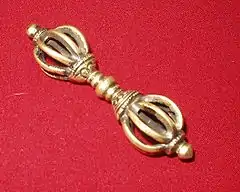金剛
See also: 金刚
Chinese
| metal; gold; money | hard; firm; strong; just; barely; exactly | ||
|---|---|---|---|
| trad. (金剛) | 金 | 剛 | |
| simp. (金刚) | 金 | 刚 | |
Pronunciation
Noun
金剛
Derived terms
Etymology 2
Japanese
| Kanji in this term | |
|---|---|
| 金 | 剛 |
| こん Grade: 1 |
ごう Grade: S |
| on’yomi | |
Etymology
From Middle Chinese compound 金剛 (kim kang, literally “metal + strong, hard”). Compare modern Cantonese reading gam1 gong1.
Noun
金剛 (hiragana こんごう, rōmaji kongō, historical hiragana こんがう)
- Buddhist term of Vajra, literally meaning both "Diamond" & "Thunderbolt," referring to the symbolic nature of both that of a diamond, (in that it can cut any substance, but can not, itself, be cut,) and that of the thunderbolt, (an irresistible force)
- the firmness of one's own spirit, and the strength of one's own spiritual power
- (Buddhism) short for 金剛杵 (kongōsho): a vajra, a dorje: a kind of double-headed scepter used in esoteric Buddhism
- (figuratively, literally) something extremely hard, of extreme strength
- short for 金剛石 (kongōseki): diamond as a mineral or gemstone
Derived terms
See also
This article is issued from Wiktionary. The text is licensed under Creative Commons - Attribution - Sharealike. Additional terms may apply for the media files.
